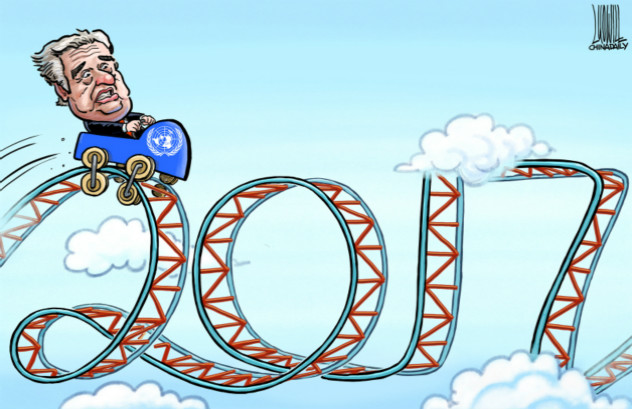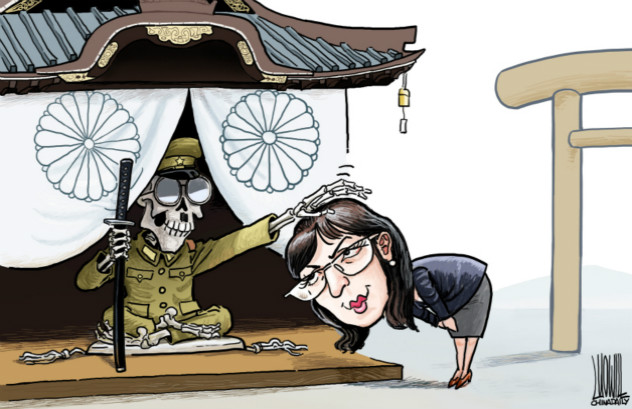Populists threaten unhappy new year for EU
 |
|
A bus carrying demonstrators drives past the Supreme Court in London, Britain on Dec. 5, 2016. [Xinhua/Tim Ireland] |
The European Union (EU) has had a difficult few years, managing a multitude of crises since the financial crashin 2008.
Last June saw the shock vote by the United Kingdom to leave the EU, and 2015 saw the near ejection of Greece from the Eurozone--the EU's single currency bloc.
There can be no doubt, just getting through this year will be an achievement for the EU, it seems hard to imagine how it could hope for much else. The bloc will face several highly-serious issues over the coming months, with some of them posing an existential threat.
Ultimately, it is the rise of populist and nationalist politicians, from the United States to Russia, and just about everywhere in between, that will cause the biggest headaches.
First up is this month's inauguration of Donald Trump as president of the United States.
Few European leaders built bridges with Trump during his presidential campaign, and none have a personal relationship with him. But within a few weeks EU leaders will be dealing with a president who admires Vladimir Putin and seems lukewarm about NATO commitments.
Member states may well be forced to spend significant money on defense again if they can't be certain of the Americansecurity umbrella.
The next major test for the bloc will be the UK's expected triggering of Article 50 in March. This will mark the start of a two-year process whereby the UK will be expected to negotiate the terms of its departure with the other member states.
Many commentators predict the EU will manage to present a united front, with the goal of extracting a high price from Britain, in the hope this will discourage further exits from the bloc.
However, negotiations will likely not bring about a display of European unity. National governments will quickly prioritise their own interests, and some will push for a quick deal with Britain. In particular, Germany has an interest in securing tariff-free access to the UK market for its exports, and Eastern European members will be under pressure to secure the rights of their nationals living and working in the UK.
When a deal is eventually done, other member states will see that an exit from the organization can be both practical and achievable.
France will hold its presidential election in April. The outcome could possibly trigger the biggest crisis for the bloc.
Currently, Marine Le Pen, the leader of the populist National Front, is leading in opinion polls for the first round of the presidential election. And while she would probably lose in the following round, the events of 2016 illustrated that we no longer live in times where opinion polls are necessarily a good guide to anything. Le Pen has promised to offer a referendum on French EU membership.A French exit would probably deliver a fatal blow to the organization.
The EU will also spend this year worrying about its increasingly unstable neighbour--Turkey.
Turkey's cooperation in stemming the flow of migrants from Syria and elsewhere is considered essential in enabling the bloc to get a grip on a problem impacting many of its members, and fuelling support for populist politicians.
Yet 2017 will likely see the collapse of the EU's migrant deal with Turkey--which allows Greece to deport many migrants back to Turkey--as both sides claim key parts of the agreement are not being met.
Indeed, the Turkish leader President Recep Tayyip Erdogan has threatened to “flood” Europe with migrants over the EU's alleged broken promises.
September will see Germany's Chancellor Angela Merkel face elections for a fourth term in office.
Merkel, who has been Germany's leader since 2005, has seen her popularity slowly erode following her handling of the ongoing Euro crisis and her decision to welcome over 1 million migrants into the country.
While Merkel's Christian Democrats (CDU) are currently leading in the polls, Merkel will ultimately have to govern as part of a coalition, if she wins. In the nine months or so until the election, there are a whole multitude of evolving European issues which could dramatically change the situation. Never mind the domestic political landscape where Merkel will face a populist challenge from the Eurosceptic Alternative for Germany party (AfD).
Even in stable Germany, nine months is a long time in politics.
This year will likely not be a happy one for the EU. It faces existential challenges, including a collapse in popular support, an ongoing crisis within its single currency zone and the rise of populist politicians across the bloc.
Increasingly, anti-EU parties in many of the key member states are becoming serious contenders for power, making it difficult for establishment politicians to be seen to be defending the European project.
The nation state is back in vogue.
James Skinner is a contributing editor at China Daily with an MA in International Relations. He has a particular interest in British and American politics, as well as global security issues.

























